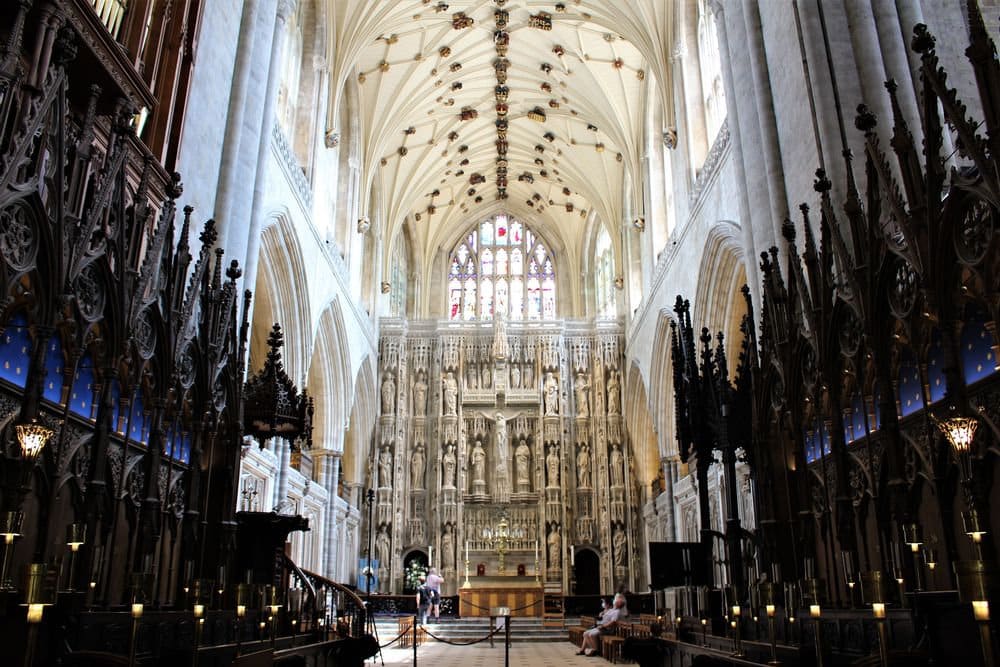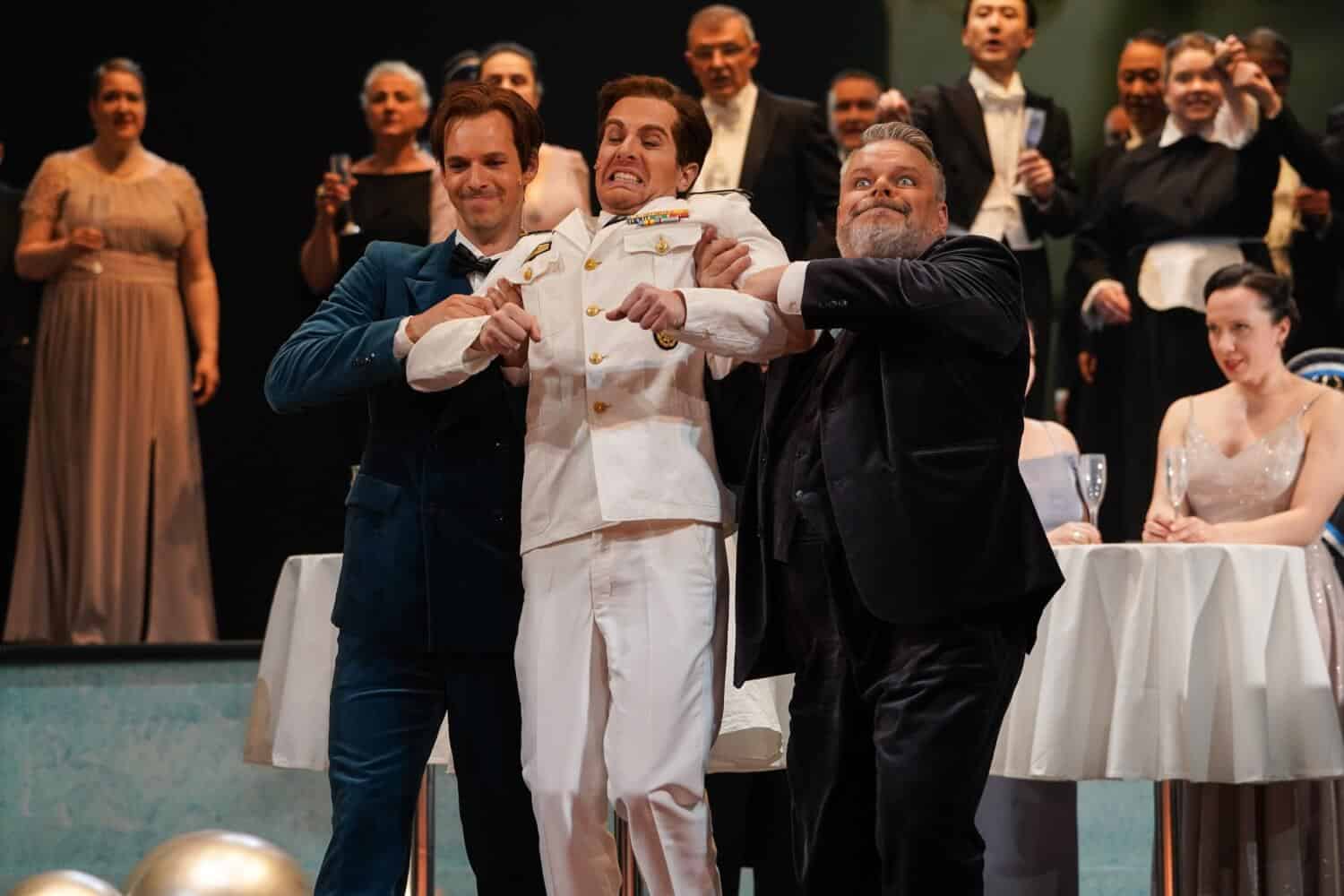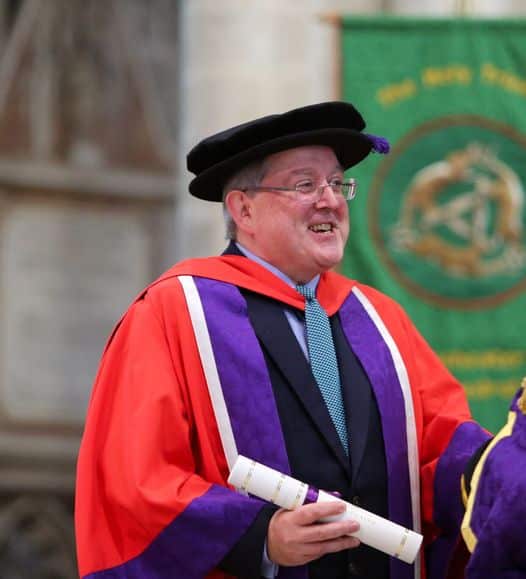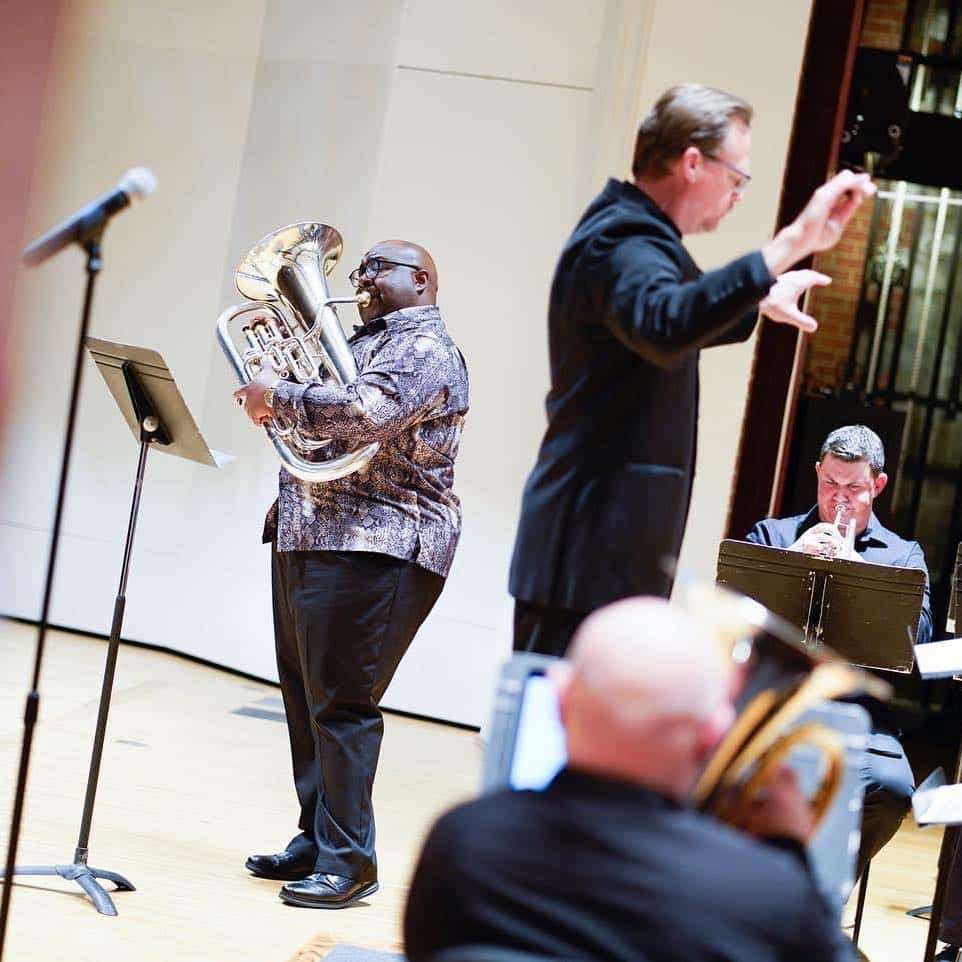Peter Gelb: We’ve sold 18 million movie tickets
mainThe Met’s manager has come out with some figures for his Live from the Met screenings, in an interview with Vienna’s tabloid Kurier.
The headline number is impressive. Even more so is the disclosure that two out of three Met movie tickets are for screenings outside the United States.
That is the extent to which Gelb’s Met dominates the opera movie audience.
It’s a huge success for Peter Gelb and a massive disgrace for Covent Garden, La Scala, Vienna, Munich and Berlin, which have tried with large amounts of public money – and signally failed – to develop a domestic movie audience for their own productions.
Germany and Austria together, says Gelb, are now his second biggest market.
The Met rules the opera world on screen. Why did we let it win?

Submit your answers below.





My parents regularily attend these cinema performances. They have been (well, rather my father has…) opera aficionados for a long time, but they live in a small town in southern Germany with the next opera house more than 100km away, while it’s only a 10 minutes walk to the cinema where they show the Met. And, without any offence, the level of the Met is obviously higher than of German middle class companies. So, despite the fact that you don’t have real opera feeling in a modern movie theatre (with folks watching 007 or a “romantic comedy” next door), they enjoy it. And they say they have the impression the shows also attract people who haven’t been in contact with opera before, even though the tickets cost about EUR 30.
But I guess most of the folks (the aficionados as well as the newbies) would also go if it wasn’t the Met but Vienna, Paris or La Scala – maybe not for Düsseldorf, Toulouse or Oslo though, you shouldn’t underestimate the glamour factor.
Go easy on Toulouse; it’s not the boondocks, you know…
I think the analysis of the numbers would need to be complex and multi-layered. The USA has about 6 or 7 genuinely functional opera houses, or about one for every for 50 million people. Germany has 83 full time houses, or one for every 1 million people. That’s about 50 times more per capita for genuinely active houses. And those 83 houses in Germany are in a country with a geographical area the size of Montana.
Put another way, Germany ranks 4th in the world for opera performances per capita, but the USA only 39th. Germany has 96 performances for every million people, but the USA only 6. Germany thus has 16 times more opera performances per capita.
“Simon’s” parents might be 100km from an opera house, but I suspect that at least 80% of Germans are less than 30 km from one. This indicates to me that the market the Met has found in Germany is due to the appreciation for opera that Germany has created through massive investment in cultural infrastructure, the employment of artists, and education.
BTW, I too live in a remote part of Germany, and the nearest house is 100 km away, but there are 9 full time houses within 90 minutes in Germany and Switzerland.
Any time New York, or any other city, wants to establish one or more full-time publicly-funded opera companies, they’re perfectly welcome to do so.
Very true. After all, with our wide and varied political spectrum, there are several parties for which we can vote that advocate the public arts funding systems necessary to create such operas……….
That number is indeed impressive. Now, if after nearly ten years Mr. Gelb can put the same energy into figuring out how to induce people to actually attend live performances in the opera house–and assure the financial good health that at the moment is sorely lacking at the Met–that will be the real accomplishment of his tenure. Attendance in the opera house has decreased by nearly 20% during the past decade.
Live or not, the HD movie theater experience for many is no better than popping in a DVD at home, with the exception of less comfort. Live theater is live theater, and experiencing the aural and visual effects first-hand cannot, as of yet, be fully realized electronically. I don’t think anyone wants the Metropolitan Opera or any other opera theater to become expensive HD production studios.
Met at the Movies is vastly different from popping a DVD at home! The quality of sound in a good movie theater, the size of the screen and the freedom from distraction in a movie theater are far superior to what most of us have at home. We do attend local opera, and the Met shows us a selection of titles and quality of performers that won’t be produced locally in the next 30 – 50 years. The cost of all 10 productions per season mounts up like another opera subscription. In a few months that performance will be shown once or twice on PBS in our homes where screen size, sound quality (for most of us) and distraction factor will diminish the impact of what we saw on a movie screen. Some of us in the U.S. have access to the movie theater screenings from LaScala and ROH Covent Garden, but their distribution is sparse here with one factor being the stipulation that theaters showing the Met in HD are prohibited from broadcasting the LaScala and ROH, ballet and British theater offerings.
It might have to do with the quality of the production.
If the MET has anything, it has MONEY. Do we know any numbers for how much they spend for the media side of a live production, compared to said European counterparts? I know that in Europe the funding for such productions is relatively meager and compromising the quality of the productions too often.
I have enjoyed many of the Met HD simulcasts and I have to disagree with the Met Fan who says “is no better than popping in a DVD at home”. Here in Montreal I have met many people who I would never have met who share a love of Opera. The performances are an event we look forward to and often sell out.
Several years ago we did have a few broadcasts from La Scala, but after one year they were dropped. It was a shame. I would love to see more but they was so little promotion of the performances, unlike the Met’s, that people just did not know about them.
That is what is behind the Met’s success. They have been able to leverage in North America an existing audience–all brought up on Saturday Afternoon at the Opera–who know that while it is not a live performance at least it allows us to share in the glory that is opera.
Excellent production values, great sound and vision, superb sight lines, and because cameras are near the stage, a better vantage point for seeing than in the nosebleed seats. I’ve never been to the Met in person, but I plan to before I’m done here. On the other hand, millions of other opera loves who won’t ever be able to go there can experience it for twenty or so bucks, and have a much more intimate experience than the people who pay for the top seats. That’s my feedback to your question about why the Met succeeds. And I hope that the other houses will figure out what they need to do to catch up. I’d love to hear and see Wagner from Bayreuth or Verdi from La Scala.
Then there’s always the matter of popcorn and slurping sodas, but I’m ok with that.
I’ve seen the Met transmissions in the UK and I’ve been at the Met when they were broadcasting a matinee from New York and I think the reason is clear : they do it better
I was in Munich for the new Mefistofele and saw it again last week streamed (free) Admittedly the production was a mess, but the camerawork and production values did not help. The sound was good, however
Last week at the ROH I was in the stalls circle for Acosta’s Carmen (terrible) when it was being recorded for broadcast. There were two cameras by the orchestra pit and four at the rear of the stalls : no booms, no automated cameras like at the Met.
Add to their generally high operatic standards some useful interviews, commentary and the like and it’s no wonder the Met has an edge over the other houses. And anyway who would want to buy the newer stuff like Ballo/Idomeneo/Tell from the Holten regime at the ROH?
Calling the KURIER a tabloid is a bit harsh.
I share a subscription at the Met and have for a years. From time to time I go to the HDs where I have a better view than from my Dress Circle seats and at 15-20% of the price. I am also a Patron entitled to use the Patron’s Lounge above the Belmont Room. Putting more butts in seats inside the house is partly about doing something other than treating your customers and supporters like dirt. The Met is zero on the minus side in the areas of appreciation and graciousness to customers, even Patrons. If I ever have to cut back on my philanthropic efforts, my Met Patron donation will be the first to go.
I have no answer for your question, but in Johannesburg those movie screenings are an absolute lifesaver for anyone who wants to hear and see great singing, a superb orchestra and great productions. There is nothing here that even comes close, as much as I agree with the promotional blurb that live music is better than recorded. Thanks, Met!
One would assume that $18m tix translates into a good income stream for the Met. However, while living for a few years in the US and regularly attending Met HD screenings, I was shocked to find out from the movie theatre manager just where the money went – pennies on the dollar to the local cinema, and not much more to the Met. The rest is pocketed by the distributor. As to why attend – Met HD revolutionised my love of opera. I lived too far from the nearest opera house to attend more than occasionally. Thru HD I came to learn about and enjoy many operas, learned a lot about what goes on back stage, the making of costumes, props, set design etc. I also made some very close friends with others who attended regularly, meeting for debrief chats, social get togethers about opera etc. Back in Sydney I still go to Met HD, and also ROH and Paris Opera (and attend live opera). The production standard of those two does not compare with the Met – apart from anything else, the Met has much better presenters (give me an animated Joyce DiDonato, Renee Fleming etc any day over the droll guy who introduces ROH operas) and the backstage tours in the intervals is great if you dont want to leave your seat during the interval. The camera work is superb – Ive been to the Met and paid a hefty price for very good seats but still find the HD compares very favourably to the real deal.
I’m seldom in disagreement with you, Norman, but I don’t think the Met’s primacy in opera broadcasts should be viewed as a competition between it and the other great houses.
I think, if you must have a winner, it’s the people who see these stellar productions. Adding similar content to the mix from the other great houses only insures a brighter future for the art, and makes ALL winners.
I live in Arizona so any transmissions to our cinemas from Europe are no longer live. People flock to the Met operas early in the morning on Saturdays because they are live. Encores on Wednesday nights are not well attended. An other thing, the Met pays attention to audience preference in types of productions shown. The most sophisticated productions are not always shown in the movie house.
[[which have tried with large amounts of public money – and signally failed – to develop a domestic movie audience for their own productions. ]]
This is factually untrue.
Here in Moscow ‘Theatre-HD’ present daily screenings of cultural events, primarily from UK and USA. Their program includes the Met broadcasts, but these are greatly outnumbered by relays from The Globe, the RSC, the Old Vic, the Young Vic, the National Theatre, the Bolshoi (yes, because the screenings are Russia-wide), and many other famous performing arts companies. The relays are usually at least 80% sold, and the premieres are always sold-out. Prices are averagely 500-800 roubles per ticket, depending on cinema and seating category (= 7.5 to 12 euros). Some screenings have a choice of cinemas, with a VIP option too (at around 15 euros, luxury seating & better sound)
But Muscovites treat these screenings as a supplement to what is on offer in live theatres, and not alternative.
I have found the sound quality extremely poor from the Met – in cinemas where it has been fine for other events. It was so very bad for Meistersinger that we left at the first interval.
Of course, there will always be an audience for the bloated, static, ‘safe’ productions the Met produce. But it is far from the only way to producr opera. Now we have the chance to compare.
Fact check: From the N. Y. Post in July 2014: “The Metropolitan Opera’s plan to push high-definition video performances into movie theaters worldwide to boost revenue isn’t panning out. The initial plan to telecast some of the Met’s best performances to a digital audience was met with great enthusiasm, but profits continue to fall and audience growth has stalled, a Crain’s New York Business report found. Last year, the hi-def profits dropped 10.5 percent. The losses aren’t the only sour note — the opera house is also having trouble expanding its audience, one of the goals of the telecast programming.”
According to a recent annual report, the Met’s investment in the worldwide HD transmission system has been amortized.
Last season, the engineer who is responsible for the HD transmission was highlighted in one of the Met’s programs; he makes every soloist’s voice sound equally strong, something one doesn’t experience in the house. Microphones are installed along the width of the stage apron for the telecasts. In-house attendees (particularly those sitting in the Balcony and Family Circle sections, where the overall sound is THE BEST) and of HD transmissions confirm that the sound in the movie theater is homogenized. Nevertheless, singers’ and scene close-ups as well as intermission features have done much to bring the performances “closer to home.”